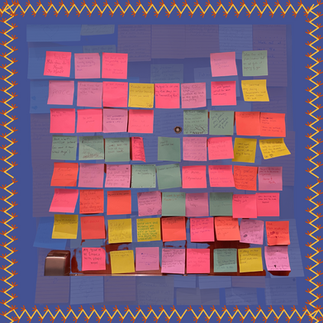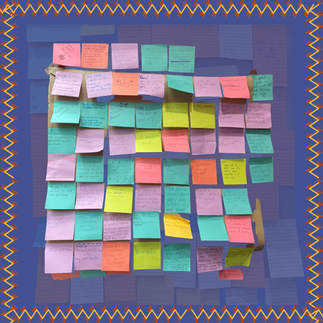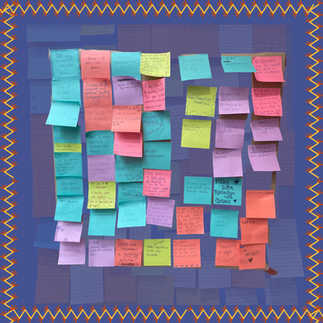Special Blog for My 2023 CyFair Teachers Mental Well-being Resources
- Tami West, PhD

- Aug 24, 2023
- 6 min read
Hello CyFair Friends! I had such an amazing time with all of you and hope you did as well. As promised, I am sending the info we talked about in the sessions. I'm not super techie, and this was the best way I could do it to make it as easy as possible for you.
I've tried to keep things organized, and if you notice I've forgotten anything please let me know. Below is a table of contents in case you want to jump sections.
Table of Contents:
1. About our short quiz
In case you didn't get a chance to write down which questions related to which domains, here they are!

2. The Mental Health Quotient
Here's the information for the Mental Health Quotient quiz I suggested you take
From Sapien Labs: Mental wellbeing is the ability to handle life and its various stresses and challenges. The MHQ is therefore a snapshot of your self-perception along various dimensions of mental function that determine your mental wellbeing. It is not a measure of happiness or life satisfaction. You could, for example, be experiencing very difficult or sad circumstances in your life but nonetheless have all the capabilities to cope as best as one could, and therefore have a high level of mental wellbeing.
Click here to visit the website and take the quiz .The link is to the main website in case you want to look around. On the top menu, you'll see Take the MHQ
** Note: If your score is negative, please seek professional advice.
Further reading:
Consider Yourself Hugged 3-part Podcast on the Mental Health Quotient:
A. Part I : Overview
B. Part II : Mood & Outlook and Social Self
C. Part II: The rest of the domains and wrap-up
3. The 6 Domains
Below are descriptions and tips for each of the 6 domains.
A. Mood & Outlook (Directly quoted from Your MHQ Results)
This represents your ability to manage and regulate your emotions effectively and your ability to have a constructive or optimistic outlook for the future.
Conversely it also encompasses feelings such as fear, anxiety, anger, irritability, guilt and sadness.
Severely distressed forms of emotional functioning include uncontrollable crying, night terrors, severe temper outbursts, extreme phobias, uncontrollable panic attacks, highly traumatic flashbacks, intense mania or suicidal intentions.
Tips from my wonderful podcast co-hosts and myself 😊
Write down your past hurts on pieces of paper and burn them (advice from my counselor)!
Medication used as a tool in your toolbox
Be vulnerable with your safe connections.
Develop deeper self-awareness
Therapy
Spend time in nature (or bring nature to you). Link to essential oil information. I found the article helpful, although some of it was outside of my realm of knowledge! Here's the link to the kit I bought from Amazon.
Tips from the MHQ articles (Understanding Mood & Outlook and How to Improve Your Mood Outlook)
Try new activities.
Revive old interest & hobbies.
Change your physical setting.
Notice & label emotions.
Allow yourself to feel your emotions & then validate them.
Separate thoughts from feelings.
Think in grays rather than black & whites.
Be your own cheerleader rather than your own bully.
Look for the positive in difficult scenarios.
Practice gratitude.
B. Social Self? (Directly quoted from Your MHQ Results
This represents how you interact with, relate to and see yourself with respect to others. It includes factors such as confidence, communication skills, self-worth, body image, empathy, and relationship building. Your social self underpins your ability to see yourself positively, successfully function in a social world and form meaningful social connections.
Distressed forms of social functioning include excessive unprovoked aggression, a strong sense of being detached from reality or suicidal intentions.
Tips from my wonderful podcast co-hosts and myself 😊
Evaluate your connections.
Grow your circle of friends.
Find mentors.
Cultivate a mentally healthy workplace, even virtually.
Spend more time with family, friends, colleagues.
Make it a daily priority.
Choose your own identity
Empathy, compassion, and forgiveness
Tips from the MHQ article (What is Social Self in Psychology)
Continue to learn about healthy connections.
Make a practice of reaching out to others.
Embrace physical intimacy
Use tools like Zoom to connect.
Make use of self-help materials – classes, etc..
Seek counseling.
My Research:
email me (tamiwest@tamiwest.com) if you would like a copy of my actual dissertation - a little light bedtime reading :)
Here is the promised 99¢ The Stress Club Kindle link. It's valid through Sunday, 8/27/23!
C. Drive & Motivation (Directly quoted from Your MHQ Results)
This represents your ability to achieve your desired goals and to initiate, persevere and complete activities in your daily life. It is associated with interest, curiosity, motivation, and is also related to your overall energy levels.
Distressed forms of drive and motivation include severe addictions which cause harm, or extreme withdrawal from activities or social interaction.
Tips from the article (Fulfilling our Goals and Dreams Depends on our Drive and Motivation)
1. Ask why
2. Be curious, interested, excited, and enthusiastic about the world around you
3. Balance intrinsic and extrinsic motivation
4. Set small, measurable goals
D. Cognition (Directly quoted from Your MHQ Results)
This represents the health of your cognitive skills which allow you to function on a moment-to-moment basis, make sense of complex sets of events and situations and display a longer-term perspective in your thoughts and behavior. It includes brain functions such as attention, memory, decision-making, learning and self-control.
Distressed aspects of cognition include severe or extreme forms of mental confusion, obsessive thoughts, sensory sensitivity, extreme risk taking, compulsive behaviors, psychosis and hallucinations. Tips from the article (Complex Cognition Reflects our Ability to Deal with Complicated Situations)
· Sometimes addressing physical disease is key.
· Take care of your physical health.
· Acquire new knowledge and skills
· Stay socially connected.
· Volunteer.
· Take up a hobby.
· Take a class.
· Limit mindless activities.
The National Institute on Aging (NIA) recommends taking care of your physical health, keeping your mind active through learning new knowledge and skills, and staying socially connected. For example, activities such as volunteering, taking up a hobby, or taking a class can help build up a “cognitive reserve,” according to the NIA.
Activities like mindfulness and meditation can also help lower stress, which in turn helps improve cognition.
Activities that combine mindfulness and movement, such as yoga or tai chi can help improve brain function over time.
E. Adaptability & Resilience (Directly quoted from Your MHQ Results)
This represents your ability to shift your behaviour and outlook in response to changing circumstances and cope with the challenges and setbacks that you encounter. It includes factors such as adaptability, creativity and problem solving, learning and emotional resilience. Your adaptability and resilience are important for your mental wellbeing as they underpin how you deal with and recover from the natural ups and downs of life, as well as more significant adverse events.
Distressed forms of adaptability and resilience include inflexibility, withdrawal and confused thinking.
Tips from my wonderful podcast co-hosts and myself 😊
Find mentors.
Cultivate a mentally healthy workplace, even virtually.
Make it a daily priority.
Tips from the articles (Resilience: Build skills to endure hardship and
Get connected. Building strong, positive relationships
Make every day meaningful. Do something that gives you a sense of accomplishment and purpose every day.
Learn from experience.
Remain hopeful.
Be proactive.
F. Mind-Body Connection (Directly quoted from Your MHQ Results)
Your mind-body connection is important to your mental health because your mind and body are a combined unit where disturbances to your physical health can impact your mental health, and vice versa. It includes functions such as sleep, appetite, coordination, sexual satisfaction, and fatigue.
Distressed forms of mind-body balance can include insomnia or chronic and severe pain, as well as a propensity for infection or frequent physical symptoms (e.g. digestive issues) with no obvious physical cause.
Tips from my wonderful podcast co-hosts and myself 😊
· Exercise
· Mindfulness & Meditation (3-minute meditation we did in class)
· Yoga
· Learn a new dance or take a walk, tai chi
· Be willing to work on your mind
· Embrace joy & laughter
· Talk to a friend
· Read
Tips from the article (The Connection Between our Mental and Physical Health)
Particular types of therapy, such as cognitive behavioral therapy, or CBT, can help you change negative thinking patterns.
Multiple studies show that increasing exercise can be effective in alleviating depression for some people. In addition to the many physical benefits we all know, exercise can actually improve nerve cell connections, making the brain work better.
Many studies also note the benefits of mindfulness, which can help rewire the brain and improve how it responds to stress.
Yoga, learning a new dance (which helps the body and brain), Tai Chi, or simply taking a mindful walk.
General Mental Health Resources:
Resources in your area:
Click below for flyer for your CyFair Employee Assistance Program.
To learn more about your CyFair ISD Employee Assistance Program, click here and scroll down to EAP Program
I was so excited to find this page on your CyFair ISD website filled with local resources!
Your Goal Quilts!
To make this less overwhelming, I've named each quilt. I saved them at super high quality so that means it might take them a minute to load. This way you can zoom in and read each one. There should be a row for each day, hence 5 rows.
Hover over it (on your desktop) an you will see the day and time of each class. Keep inspiring each other!
Well, friends that's all for now. I hope I haven't overwhelmed you! I'll be sending out some other info soon on a free webinar I'll be doing in October for World Mental Health Awareness Day.
Stay tuned and take care of yourself!
Hugs,
Tami







































Comments